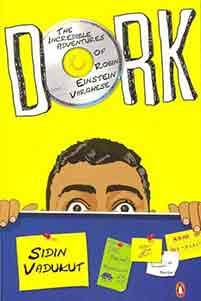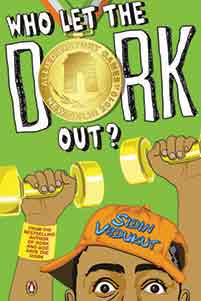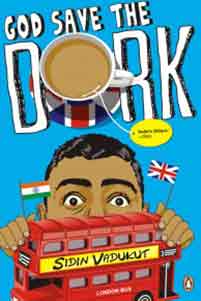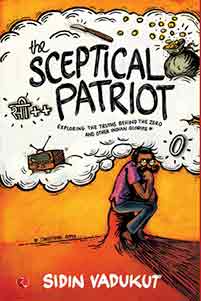IIM-A also gives you skills to be a writer: Sidin Vadukut
Not many would give up a high-paying career in management consulting after studying at Indian Institute of Management (IIM) Ahmedabad - India’s No. 1 business school. But Sidin Vadukut did exactly that.
He chucked the MBA lifestyle, took up a writing career and the rest, as they say, is history.
Today, Sidin is the author of four bestselling books – the Dork Trilogy and The Sceptical Patriot. He is also working as the managing editor and foreign correspondent with The Mint, based in London.
Here’s Sidin Vidukut, in an exclusive interview with Shiksha.com, talking about his ups and downs, lady luck and his journey as an author – all with a pinch of the famous Sidin-style humor.
Listen to Sidin Vadukut's exclusive podcast here:
Subscribe to Shiksha Voices on Soundcloud.com and stay tuned for more education and career related podcasts.
You can also read the interview below:
1. Please tell us about your family background and upbringing?
I was born in Kerala but was shipped away to Abu Dhabi when I was just a few months old. My dad worked in the Gulf for a private company for many years – from 1974 to 2010. I came from not a particularly wealthy family, but we got wealthier over time as my father and his brothers and sisters started doing better for themselves. Otherwise, my grandfather was a tenant farmer. With more time in the Gulf, my uncle joined a bank and lived there for many years. Over a period of time, we kind of crawled our way into middle class. I was also brought up with a particularly an Indian and Malayali sense of being in the middle.
2. Were you a studious person? What did you study?
I was never a studious person. But I was very organised while preparing for exams. I wasn’t the kind of person who would study all throughout the year or study at the last minute. I would have a plan and prepare for exams. As I grew older, I started enjoying exams. I know this is a tremendously geeky thing to admit! I still enjoy taking exams – multiple choices, essay questions. I just find it interesting. I enjoy exams because in many ways, they are a competition against yourself. I was never bothered over how well I did vis-à-vis anybody else - wasn’t always in the race to get high ranks. I would just do them to the best if my abilities. And most of the time, it was kind of enough to kind of push me into the top five or top ten.
I did most of my schooling in Abu Dhabi and then I moved back to Kerala in 11th and 12th, where I studied at the Saint Thomas College in Thrissur. Back in the day, it used to be called a Pre-Degree Course. Then I joined REC Trichy for Bachelors of Engineering in Metallurgy.
I tremendously enjoyed the course and did fairly well at it. Over those four years, I developed a reputation for being the guy who read novels during exam period and goofing around, but still managing to score decent marks.
This is not completely true. My approach during exams was always to study very hard while I was studying and goof up really hard while I was goofing up. So I studied for four hours, goofed up for a couple of hours and then come back and studied for four more hours. And I always just shut shop at the end of the night before exam. I was never one of those people who studied throughout the night in mad panic.
Because I stepped back from engineering/MBA lifestyle into writing, some people assume that I am weak at these things. I was a fairly decent engineering and MBA student.
3. After pursuing MBA from the most illustrious institute – IIM Ahmedabad – why did you decide to be a writer?
(Sidin passed out from IIM Ahmedabad in 2005 and worked as a business consultant for two years, before becoming a writer/journalist.)
Everyone asks me this question. It’s an odd question because people assume that IIM-A gives you no skills to be a writer. In fact, one of the things that the institute aspires to is that MBA programme is meant for anyone who wants to participate in any organised activity – anything from running businesses to working for a company to working for an NGO or government and so on. They give you a set of generic secular skills that you can use in any walk of life. And I am not joking when I say that I do fall back on some of the skills they taught me in business school – working with data, approaching problems with logic, fighting ambiguity. People say that a good MBA is supposed to work with ambiguity. I don’t completely agree. I think good MBAs take on ambiguous situations and make them more straightforward.
And people are often like, “Oh, my God, you took such a big risk.” If you are from IIM A, taking risks with your careers is not as risky as it would be for somebody from another business school. Because we always have the fall back of the alumni network and the job network and career networks. So if anyone should be taking a risk with their careers, it should ideally be someone from one of the better institutes in India.
I decided to become a writer, because I wasn’t enjoying the MBA lifestyle. I had a blog which was fairly popular. I was thinking of writing full time for a livelihood for some years. I decided to take the risk when I was young and didn’t have any liabilities. So, I quit the MBA lifestyle, became a writer and have never looked back since…. more or less.
4. Take us through your journey, all about the ups and downs.
My journey was less turbulent than people think it was and involved a lot more luck than people think it could. People always assume that it’s all about hard work with many ups and downs. But there weren’t as many ups and downs. I was very lucky.
As soon as I quit my management consulting job, I immediately got a call from The Hindu (newspaper). One of the editors at The Hindu read my blog and he was quite interested. He extended an opportunity. My response to that was grab it with both hands, not discuss remuneration too much. Just write and deliver good work week after week. I wrote for The Hindu for many years after that. That helped build my resume and create brand as a journalist and writer. I was very lucky with that.
After I started writing, every year I would get this lucky break from somewhere. Some people might waste this. But my reaction to this is whenever there is a door opening, I always walk through it. Talk to the people, put in my best. Make sure that even if I don’t want an opportunity that is extended to me, at least make new friends and open new doors, so there’s always something to fall back on. You could say that I was falling back on some of my MBA fundas such as risk management.
I started as a columnist. Then I wrote a book which I never published and have now lost the manuscript. It was the first thing I ever wrote. It taught me discipline of sitting in a place and write for several hours a day.
It would have been a terrible first book to publish. I think my life would have taken a very different track, if I had published that book. But because I wrote the whole book – about 70,000 words – it convinced me that if I can write for a living. It was like an added self-validation.
So I got the newspaper column, writing for a book, little bit of other writing jobs such as blogging for Kalagoda festival for a few hundred Rupees a post – all kinds of stuff. I also took on other consulting jobs to pay my bills.
Then I joined JAM magazine as an editor. This taught me editing. And later through serendipitous meetings with people and occasional freelance writings, I got a job with The Mint. And I have been with Mint for the last six years.
There were more downs in the first one and a half years. It was tough financially in the beginning. I lived from cheque to cheque. Went broke, maxed out my credit cards when I got married. Spent a couple of years paying back credit card bills. All that was a little hard. But I approached it optimistically. I understood this is a short-term pain that I would suffer for a long-term career benefit. And touchwood, it kind of panned out that way.
It’s not a rags-to-riches or lone-man-fighting-adversity story. It was a nose-to-the-grind-stone, chin-up and work-and-get-stuff-done. One thing that I did do a lot was to grab every opportunity I got. If anybody offered me writing work and it paid decent money, I would do it. And as I got better at it and developed my brand, I slowly stopped doing work for free or small amounts of money and so on. So I was not entirely unjust. I didn’t stretch myself so thin that I was turning out bad work. And finally, that’s the most important thing: as much as possible, I would never publish bad work.
5. What has been the toughest moment in your career so far? And what has been the biggest high?
The biggest high was getting my first book published. That was an amazing high. I was more happy with the fact that it was published than the fact that it succeeded. It was rewarding to see it in print.
The toughest moment was the period between freelancing and working with JAM/Mint. This was when I started picking up consultant jobs to pay the bills while I still worked on my writing. You always hope that once you decide to become a writer or choose a career, it becomes self-rewarding quickly. In my case, I had to wait for more than a-year-and-half before I could depend on writing to pay my bills. That was a period that sometimes shook my confidence. It seemed like an insubstantial airy-fairy plan. Had I been stuck there for a few more years, I would have given up. I was lucky that breaks came and finally I was able to write for living.
6. We loved The Sceptical Patriot and the Dork trilogy. What next?
Thank you. My next book is also going to be a non-fiction book, approximately as long as The Sceptical Patriot – 65,000 to 70,000 words. I am going to look at a very specific institution – Indian history – between the 17th and 19th centuries. I have been doing a lot of research in the last couple of months. I hope to start writing in December and finish by January-end or February and have it in the market next summer. That’s the plan. I am super excited. It’s a wonderful part of Indian history that not a lot of people are clued into. I have been reading incessantly English translations of 17th century documents and so on. Surprising, not many people have written about the period which is kind of scary because then people assume that you’ll do it from an academic perspective. But I am going to write a fun book, with bits of travel, bits of history and bits of observation.
7. What are your views on other ‘MBA authors’ like Chetan Bhagat, Amish Tripathy, Rashmi Bansal and others?
I am happy. In fact, people kind of assume, for whatever reason, I am going to be dismissive a lot of other authors. I think Chetan Bhagat is really important. He kind of kick-started reading in India. I know lot of people who hadn’t picked up a book since school for 20 or 30 years. They went back to reading because of Chetan Bhagat and his books. A lot of these ‘MBA authors’ like Rashmi, Amish, Chetan and others write for segment that was under served in India – which is people who want to read accessible books about their own lives and about their own societies and cultures.
I remember growing up, if you go to an Indian bookstore, we’d end up buying magazines and RK Laxman classics, boring non-fiction or coffee-table books. But there was nothing that spoke to you about the life you lived.
Now, there are so many more Indian authors writing about the lives of ordinary Indians. Most of these authors are from urban middle class. And the urban middle class deserves to be written about. It’s an important aspect of what India is today. Being a member of the urban middle class is what so many millions of people aspire to in India every day. We may not have not completely captured the experience so far. I just love the fact that there are so many books. Even in fiction, it’s great to see so many thrillers, crime novels and all other kinds of stuff.
For me, more people should write more books in more genres. I tend to focus on non-fiction because that is tremendously underserved in India. When I first started writing, someone who worked for my publisher said, “You know, the Dork books, we don’t know if it’ll work. It’s very niche – office culture. Don’t know if too many people will read.” All of us were taken aback by how well the books have done. The Dork books had such a long life. People keep reading it and I still keep getting letters from people who’ve read the books. It appeals to a wide cross section of society.
So, to encapsulate my answer, there’s this big heaving mass of people who are interested in reading all kinds of fiction and non-fiction. And India is nowhere remotely close to serving them.
It’s also an issue of language. Lot of MBAs come from good schools and colleges and therefore good with English language. There was a time when there were only MBAs writing books. The monopoly has died away now. There is nothing wrong with MBAs writing books. In fact, I have never seen any other country, where people are worrying about educational qualifications of a particular genre of writers.
I am good friends with most of these people and keep in touch with them. It’s wonderful to see how much the Indian bookstore has changed in the last ten years.
8. MBA is a hot favourite today. What are your views? Is an MBA degree necessary to be successful and to rise up the corporate ladder?
One has fairly reasonable chances of being successful with and without an MBA. But there is a constraint in the corporate ladder movement because most Indian companies tend to hire the management through the MBA route. Some of the best business jobs in India go to MBAs from better schools. But it is more of a supply-demand issue. And there is very little anybody can do about it. It is definitely possible for some people to break through it.
In India, MBA is the perfect qualification where everyone wants a high paying corporate job with low risk, even though the overall corporate sector in India is riskier than it used to be. What ails MBA education is pretty much what ails any other kind of education in India. The only benefit MBA has is that it has a much more structured formal recruitment angle. One has a much fairer chance of getting a job with a good MBA than you do with a good any other degree. It is a rewarding degree worth the investment.
My advice to people pursuing MBA is ‘try to leverage your ability to learn in B-School.’ Many people just get a job and stop or go through the motion like they would in college. But B-School is a great place to pick up lot of skills – meet people, read up on humanities, learn economics.
If I could go back in time and do my MBA all over again, I’d probably learn more. I wish people would leverage everything available on campus – professors, peers, libraries, etc.
9. What tips would you like to offer to the young writers and editors?
My number one tip is read a lot. That is the single most important tip. You should be reading a lot before you can start writing anything. There are many reasons for this. Not only does it expose you to various forms of the art and nuisances of the art of writing, but it also exposes you to what you want to do. I read indiscriminately and read everything. I only read non-fiction and humor when I was young, I identify with those particular genres and styles of writing or particular substantial approach to writing.
I know so many people who are obsessed with writing but just do not read at all; or only read classics but are writing popular fiction. It helps if one reads across all genres as widely and as indiscriminately as possible. Expose yourself to the endless gamut of options available. It’ll make you a tremendously better writer. It also teaches where to look at and which aspect of your craft to hone.
Do you want to become a writer based on style, or a writer based on substance – all these questions can only be first asked and then answered, if you have read enough literature.
10. Please offer some tips and guidance for our student audience.
I don’t want to give a laundry list of tips and guidance. My suggestion is this:
If you are a student right now, chances are that you are cynical student in an institute or school somewhere and deeply dislike where you study. You probably think your college is uncool and nothing compared to MIT or Caltech etc. I find this cynicism all-pervading in the Indian education system. Indian students have these definite deliverables from the education system that they get and leave. Don’t do that! Whatever school/college you are at, make the most of it. Whatever library you have, read all the books. Whatever playing ground you have, play everything. If things are broken, improve them. If you can’t improve them, make the most of it.
Somebody once said, in many aspects of your life, you can only play with the cards you have been dealt with. There is no point in sitting and moaning about the cards you don’t have in your hands. I have been across various education institutions in India. One thing that helped me a lot is that I was being able to cherry-pick good aspects of every institute I went to. And that’s my big advice to every student listening to the podcast or reading this article.
11. What do you do in your free time?
I spend most of my free time reading. I also watch a lot of television – love cookery shows. I love cooking. Also do a fair bit of traveling with the family. Living in London is a good opportunity to travel all over Europe. I also do a lot of museums, book-readings. So basically, I keep myself fairly busy. Because of my work, I have the freedom to mold work and free-time together. So, if I am travelling on work, I try to write a travel piece on that. If I go to an interesting museum, I try to work it into one of my books, articles or columns.
I try to make sure that I live a life which leverages all the opportunities which is rich and enjoyable. There’s at least something to enjoy in everything I do. Most of my free time is involved enjoyable inputs – listening to radio shows, reading books, enriching myself with what’s happening.
I am not reading books that have anything to do with my work directly. So I read science books, but I don’t write a lot of science. I love reading religious history. I am reading Diarmaid MacCulloch’s History of Christianity, but never going to write on Christianity.
12. What does the future hold?
Depends. If you mean the future of the world, difficult to say.
But the future of India is bright. If you are a young person India right now, you are very lucky. Because there are very few places in the world where young and smart people live in an economic environment which is growing fairly well with reasonable amount of jobs and there’s scope for entrepreneurship. The cost of living is still low where you can graduate from a college and live frugally, save and start-up your venture. There are very few countries in the world where you can do that and India is one of them. India has so many unmet social, cultural, commercial and economical needs. There’s tremendous scope.
I am a short-term realist. India is not going to change spectacularly in the short term. But I am a medium long-term optimist. There are many young people with good ideas. All we need is institutional rebuilding that will help make it easier for smart people to do smart things.
You can follow Sidin Vadukut's handle @sidin on Twitter or visit his website here.





